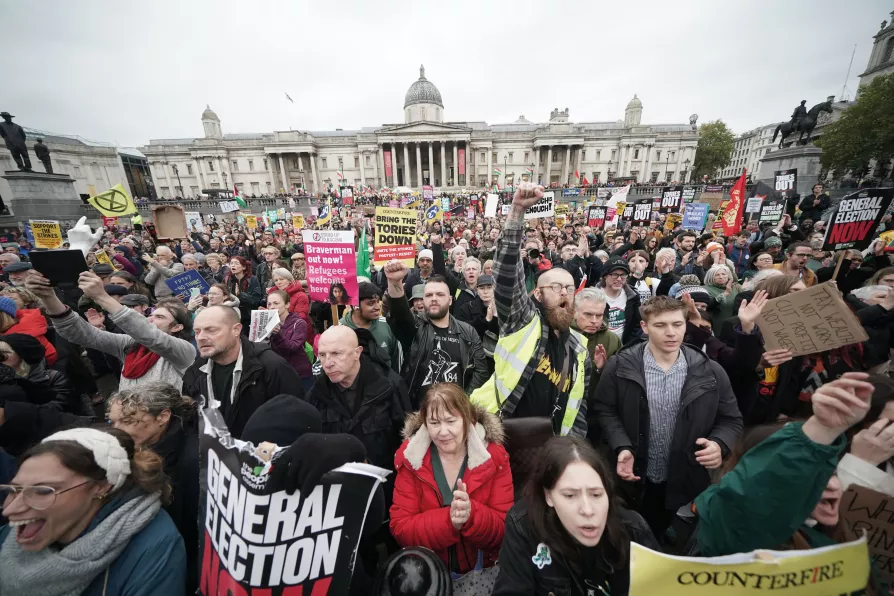Hundreds protested against the US-Israel attacks on Iran in Parliament Square on Saturday, fearing a wider conflagration and horrified by the targeting of young schoolchildren, writes LINDA PENTZ GUNTER

 MASS PRESSURE: A People’s Assembly demo in 2022
MASS PRESSURE: A People’s Assembly demo in 2022
THE queue to bury the Labour Party is longer than usual — and for good reason. But on the eve of English local elections and in the twilight of the Tory government, there is no Labour corpse.
Of course, national and international issues will motivate electors to vote one way or another tomorrow. But uppermost in their minds will be issues such as the cost of living, the state of the NHS and local public services, and the lack of affordable housing.
Even so, the biggest section of the electorate will simply abstain, many of them sick of what they regard as barren politics and vapid politicians.
Except when the polls coincide with a general election, the normal turnout in local elections in Britain has dipped from 41-48 per cent in the 1980s to around 29-35 per cent over the past decade or so.
This also reflects the impact of austerity on local government finances and services, reinforcing the feeling that voting in local elections changes very little.
So where does this leave the labour movement and the left?
For some, the overriding priority is to fight against Labour wherever possible, especially where Labour-run councils and candidates have refused to consider resistance to cuts in public sector services, jobs and facilities.
In quite a few localities, there will be independent, ex-Labour, socialist and Communist Party candidates who are running on a platform of campaigning against cuts and privatisation, for raising funds or drawing on reserves where possible, against the new law banning council policies aimed at Israeli occupation and genocide in Palestine, etc.
Many such candidates will deserve people’s votes.
But this does not justify a blanket anti-Labour approach in local or general elections, especially based on issues far beyond the remit and influence of local councillors (many of whom no doubt deplore Israel’s massacres in Gaza).
The Keir Starmer gang has imposed a strict policing regime on the Parliamentary Labour Party, constituency parties and on the whole party apparatus. However, the shadow cabinet is not the Labour Party.
Disgusting though Starmer’s pro-Israeli genocide, pro-Nato, pro-nuclear rearmament policies are, even they do not represent a fundamental departure from Labour’s traditionally pro-US, pro-imperialist standpoint which has been in place since 1924, when Ramsay MacDonald ordered the aerial gassing of Iraqi villages.
Although millions are repelled by the industrial slaughter in Gaza, an all-round anti-imperialist consciousness has yet to develop on a mass scale. People want to inflict a defeat on the Tories on May 2 and then sweep them out with the rubbish at the general election.
Neither can be done without widespread Labour victories in wards and constituencies.
Despite Starmer’s backsliding, U-turns and betrayals, millions of working-class people will be voting for the only alternative party of central government come the general election.
Are we with those millions or against them?
The Communist Party’s view, confirmed at its 57th congress last November, is that a Labour victory is preferable to a Tory victory. While guaranteeing nothing without a struggle, it would nonetheless raise people’s morale, confidence and demands.
Lib Dem gains from the Tories will not contribute to this result; instead, they would help revive the yellow turncoats and charlatans who helped inflict austerity on us between 2010 and 2015.
For the left, making an ostentatious show of cutting itself off from the Labour Party at election time will alienate many Labour voters and key sections of the labour movement who need to be won closer to the left in the battle of ideas against capitalism and imperialism.
At the forthcoming general election, there will be opportunities to challenge the worst of the genocide deniers and nuclear bomb lovers in the shadow cabinet and the Parliamentary Labour Party.
A united front can be built around non-sectarian progressive, socialist and Communist Party candidates without endangering the prospects for a Labour victory. Then the political class struggle can be raised to a higher level, as we trample the Tories into the ground.
The possible demise of the Labour Party has been proclaimed in the past: in 1931, after the defection of MacDonald, Snowden and railway union leader Jimmy Thomas; in 1987, after Thatcher’s third election win; and in the wake of the Iraq war as anti-Labour alternative parties and alliances have come and gone.
Like it or not, Labour remains the main electoral party of the working class and labour movement, with millions of voters, thousands of socialists and major battalions in the trade union movement aligned with it.
Building a united front, a militant left-wing and labour movement, and a stronger Marxist-Leninist Communist Party, will be all the harder if we alienate our many potential allies and supporters who identify with the Labour Party at election time.
The Communist Party’s programme, Britain’s Road to Socialism, explains the contribution that left governments based on a progressive, Labour, socialist and Communist Party majority — as the product of extra-parliamentary mass action — can make in opening the way to socialist revolution.
Tory victories at the ballot box, while the left pursues “will o’ the wisp” substitutes for the Labour Party outside the labour movement, offer no way forward.

In the run-up to the Communist Party congress in November ROB GRIFFITHS outlines a few ideas regarding its participation in the elections of May 2026

STEPHEN ARNELL examines whether Starmer is a canny strategist playing a longer game or heading for MacDonald’s Great Betrayal, tracing parallels between today’s rightward drift and the 1931 crisis

VINCE MILLS gathers some sobering facts that would inevitably be major obstacles to any such initiative












